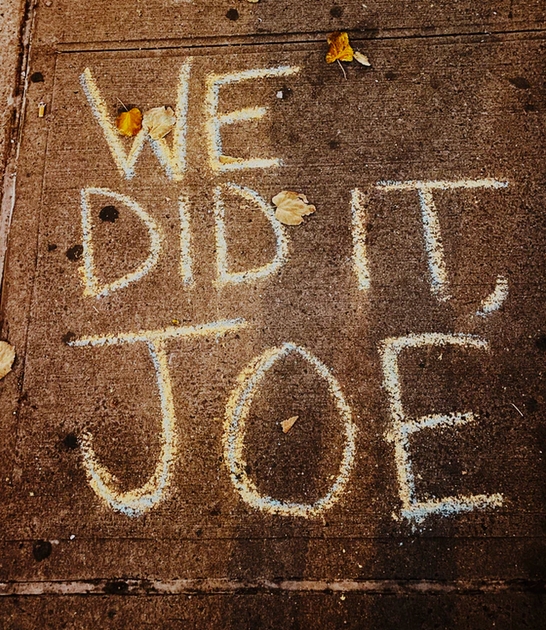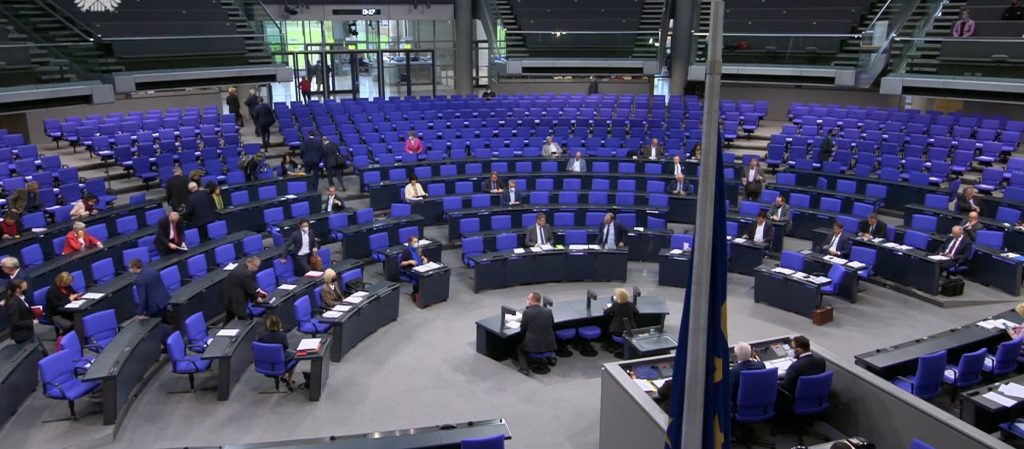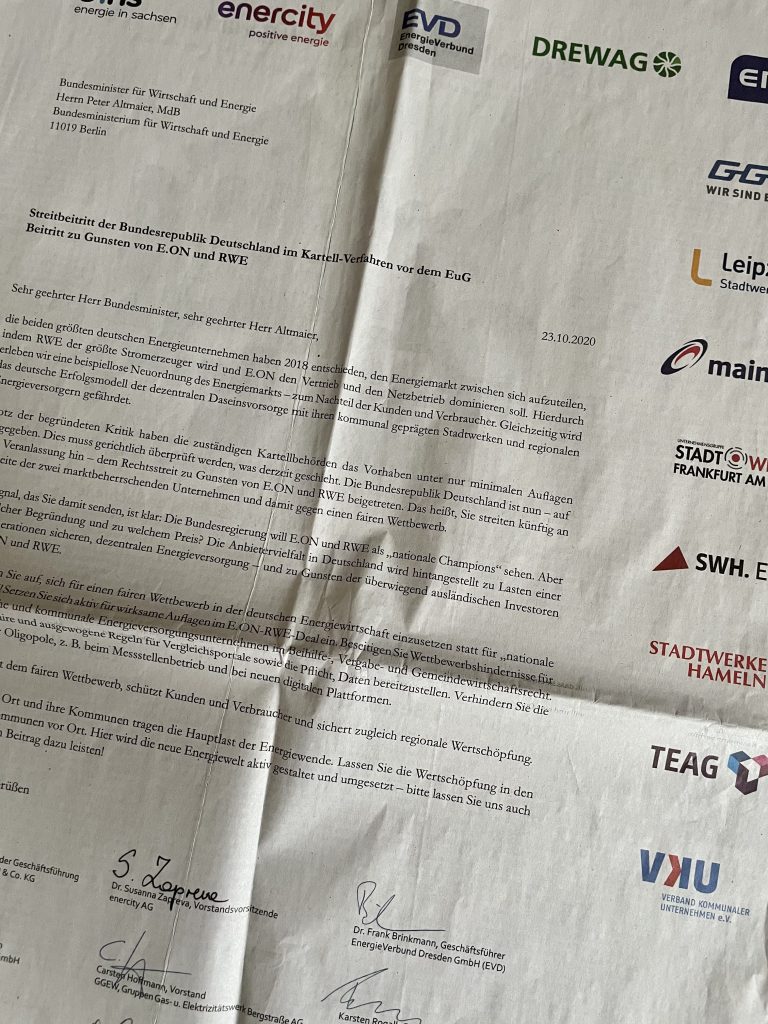
SSNIPpets (41): Hope!
Lockdown light. Trump has been voted out of office, a company from Mainz, Germany, has apparently developed a vaccine, and most freshmen leave their cameras on during digital lessons in class. Glimmers of Hope. Rupprecht Podszun is riding the 2nd wave – here are his SSNIPpets, small but significant news, information and pleasentries – our pet project!
The fifth season of the year
Karneval, a German tradition that is close to Mardi Gras in New Orleans or the Rio Carnival, just more German, you know, traditionally starts in the Rhineland on November 11, and it then extends into February in various dimensions of madnessgaiety. I am largely immune to the merry riots of such festivities, and even the celebrations at the Federal Cartel Office in Bonn, which I was allowed to attend many years ago, could not change that. (However, I have never forgotten the performances of one case handler gifted on the guitar and in carnivalesque poetry, from whom one would certainly not expect this when sitting opposite him in an investigation, that was really funny!) I rather shrugged my shoulders that carnival is cancelled this time, yes, dear Düsseldorfer friends, I confess this here.
But then: Call from M., on the 11th, an old acquaintance who runs a large music store: “Most of my customers are unemployed. Many musicians earn their basic income for the year during carnival festivities. None of them buys even one guitar string anymore”. That won’t be much different next year – how are the now unemployed carnival combos (which are only exemplary for the whole culture/event industry) supposed to pay for their sound systems? M. is an optimist, otherwise he would not have become an entrepreneur. As an entrepreneur, however, it is not his thing to fill out grant applications and forms and beg the state for money.
You may be waiting for the clou of this phone call. Unfortunately there was none.
Who must not be named
Other retail companies are not quite so hard hit, and that is gratifying. For example, one Seattle-based online retailer increased its quarterly sales by 37% year-on-year to $96.1 billion. It is better not to mention the name here. I learned from marketing experts that every mention of this name in particular only activates the impulse in the brain to buy something there. Even if mentioning is connected with key words such as “tax evasion”, “bad working conditions” or “exploitation of data”.
Yes, yes, it was not only going well for the company “who must not be named”. The European Competition Commissioner has sent a Statement of Objections. However, if the case ends up like Google’s, it may be quite a while before something tangible happens.
Not much has happened yet in the area of Google Shopping, there is a lot of controversy about the suitability of remedies. Normal, says Pablo Ibanez Colomo:
“I certainly do not see this case as a one-off or an aberration, but a sign of the challenges to come under the new competition law. ”
I’m not so sure whether that’s true – or whether it’s not the other way round. An interesting coalition of 135 companies, including Booking.com and Tripadvisor, urged the Commission to act now – not wait until some distant day when the Digital Services Act may be implemented. Thomas Höppner, who is mandated in this case, recently presented a really long evaluation of the Google remedies, which came to the conclusion that the implementation so far has not benefited competitors (seen differently, though, by Google and the EU Commission). I do not want to judge on this, but I can say one thing: the graphics in these 390 pages are a big enchilada for a legal opinion!
Compliance Officers, please!
When I look back on the difficult history of antitrust enforcement against the GAFAs, several points come to mind. And this one too: the corporate culture, or perhaps rather: corporate non-culture.

Please allow me to share another story from my early days as a cartel enforcer – I am still inside at this carnival party at the Bundeskartellamt 15 years ago. Before I was to make my first phone call about an unpleasant refusal to supply at a large chemical company, I asked my instructor what I had to prepare myself for during this phone call. I was a bit nervous, of course, because I was about to explain to a company representative that they might be breaking the law. Would he let the dogs out on me? “Oh nonsense”, said my experienced boss: “These are pros, they work with anti-trust authorities every day, they know the law and if there is a breach of law, it will be stopped”. That is exactly how it happened. Deliveries were resumed after the call.
Just as a hypothesis: Perhaps this basic trust is no longer justified in view of a completely new aggressiveness of business conduct. At least there is anecdotal evidence for this:
Exhibit 1: When UBER’s business model was banned by the courts in Germany (based on the laws of unfair commercial practices), UBER declared unaffectedly that it would continue to offer its services. Manager-Magazin quoted a spokesman for LG Frankfurt as saying that he “had never experienced anything like this”.
This case is for me the business law equivalent of the other breaches of the rule of law that have shaken us in recent years.
Back to Manchester
Exhibit 2 is not directly related to the law in the same way. It even originates from labour law. But according to my somehow ordo-liberal understanding, someone leaves the consensus as to how much respect and decency may be expected.
I call Reed Hastings into the witness stand, he is the head of Netflix. He was interviewed by Anne McElvoy for The Economist asks. I learned that Netflix employees in the USA can take as much holiday as they want. In principle, you can go on vacation at Netflix all year round! Maximum freedom, flat hierarchies and so on, or “no-rules rules” as Hastings calls it. Great!
But there is another rule at Netflix: If you only “perform adequately” and not like a “star”, you will not pass the “keeper test” and will be fired. Apparently without any hint of “conscience” or even irony, Hastings writes that after the first such wave of firing, the entire office did not feel depressed, but
“like it was filled with people who were madly in love with their work”.
At Netflix they apparently know a lot about acting. Unfortunately, Hastings was unable to answer Anne McElvoy’s pointed question about how many people ever dare to go on holidays at Netflix.
I then switched it off because I was afraid I could turn into a socialist. I have never learned to appreciate German labour law as much as I did after this interview with a Manchester Silicon Valley capitalist. If you still love your Lockdown Netflix subscription, perhaps you may wish to listen to the interview. After all, you also learn that Netflix does not fill every little supporting role after a data analysis.
Live from the Four Seasons Total Landscaping

But now for the good news: Joe Biden will be moving into the White House in January! And Kamala Harris will take over the pretty house at Number One Observatory Circle where Joe Biden had lived some time ago! She has the atomic clock at her disposal. Her partner Doug Emhoff, who is celebrated in social media as the prototype of the modern man, is a partner with DLA Piper (currently on leave).
Biden/Harris have some big tech lobbyists working in the Transition Team, but also some critics of big tech. It is expected that the recent somewhat uncomfortable line for GAFA companies in the US will be maintained in principle, although Silicon Valley companies have donated quite a bit to Biden/Harris and Harris is closely involved with the Californian business scene. However, the MIT Technology Review suspects that the “techlash” will not be a top priority. Remember: The Obama administration was not exactly critical of big tech. But all this is of course still “too early to call”.
The German Act in Parliament (finally)
In Germany, the amendment of the competition act is now pending in parliament, and there will be a hearing in the Economic Committee at the end of the month. Our readers are well aware of the federal government’s draft law. The opposition parties FDP and Linke have submitted supplementary proposals, the Greens have submitted two (here and here), all of which – like the government’s draft bill – have been written with great love and expertise. It is an interesting time when all parties of the spectrum are pushing for tightening and strong reforms in competition law. The Greens, for example, are calling for 50 new posts for the Federal Cartel Office, powers in consumer law and easier compensation for cartel damages, the Liberals want regulations for data access in the smart home and the Left Party wants control of killer acquisitions. Not all of these proposals will probably be adopted by the majority in the Bundestag (Christian Democrats and Social Democrats), but the debates are being conducted with passion. Those favouring exemptions from antitrust law for themselves, e.g. public broadcasting corporations or hospitals, seem very old-school.

A first reading in the Bundestag has already taken place. I was astonished to read the minutes. Of course, this was a showing of the first guard of the knightly saviours of free competition in the German Bundestag, including Matthias Heider, Hansjörg Durz and Falko Mohrs, three Members who had already represented the coalition parties in the Competition Commission 4.0, Michael Theurer of the Liberals and Katharina Dröge of the Greens, a Joan of Arc of parliamentary antitrust law. Secretary of State Elisabeth Winkelmeier-Becker presented the draft law on behalf of the Government. I was not surprised that the speeches were almost exclusively centred around § 19a GWB-E and the measures to tighten abuse control against large platform providers. But what did surprise me: Nobody bothered to use the famous line of the competition act as the “Grundgesetz der Marktwirtschaft”, the constitution (“Basic Law” in Germany) of the market economy! This is really is part of the standard repertoire of parliamentary debates on competition, and it completely lacked this time. SPD politician Mohrs came closest to the matter:
“Competition is one of the foundations of our social market economy and therefore has a very elementary importance in our German economy.“
Check. But maybe the parliamentarians are tired of references to the Basic Law, since every German virologist (i.e. every German) goes through the proportionality test every day.
Durz did not stop at the Basic Law, but just took another reference from another famous opus, the bible. 1st Book of Samuel, 17,3. As our well-disposed readers will know, this is the story of David against Goliath. From there it was of course only a few lines to the term “level playing field”.
Super
The draft law of the Federal Government is accompanied by the opinion of the National Council for the Control of Rules. That is a body that examines bureaucracy. And they found something. It is in a part of the new draft bill where most of us will only glance at with tired eyelids after all the flickering of the strobe flashes of the abuse disco ball: According to Section 47k (2) of the draft, the Market Transparency Unit for Fuels at the Bundeskartellamt is now also to receive volume reports (not just price reports). Once a week petrol stations would then have to report the “quantity delivered in the course of every quarter of an hour”. This would probably further increase transparency in this highly emotionalised market.
But the market transparency office is a controversial thing anyway, or a “bureaucracy monster“, as the Petroleum Industry Association once put it. The Normenkontrollrat is sceptical about whether quantity reporting is really necessary:
“The general interest of a public authority in obtaining additional data without a specific reason for doing so is not a sufficient reason for the significant additional burden (around 2000 Euro) on individual small companies. Such a measure is remarkably at odds with the Federal Government’s commitment to cutting red tape, especially for SMEs. In this case, it is clear that an evaluation of a statutory regulation must not be carried out to any great extent by the implementing authority itself, since no objective results and conclusions can then be expected”.
Wow. I am sure that some undertakings subject to competition law would see further fields of activity in our beloved area for these examiners, where the “general interest of an authority in additional data” might be a bit too far-reaching…
Secrecy
I had written on a piece of paper that I wanted to add something here that I had read in the LinkedIn profile of Assimakis Komninos, the Brussels lawyer. His posting is now five months ago and my note probably dates back to those days, too. But that fits well with the topic: Komninos had pointed out that about 2.5 years have passed between the decision in a Qualcomm case (24.1.2018) and the publication of the decision (8.6.2020).
Article 30 of Regulation 1/2003 states
“The Commission shall publish the decisions which it adopts pursuant to Articles 7 to 10 and Articles 23 and 24”.
It does not say when it will publish them. In its Best Practices, the Commission writes that it “will endeavour to publish as soon as possible…“. Well, this reminds me of myself when I promise to do something asap, so – no front, dear Commission. I know that there are disputes over business secrets, but to be frank, a publication two-and-a-half-year after taking the decision still seems a bit out of proportion.

Energetic signature list
I am a fan of full-page advertisements in newspapers in which the signatures of concerned fellow citizens are printed in facsimile. On 26 October 2020, there was another opportunity to study signatures, such as the very energetic H of Carsten Hoffmann or the gentle flow of the signature of Dr. Frank Brinkmann, who signed the advertisement twice. Manuel Schrepfer, PR Manager of the law firm Becker Büttner Held, was named as responsible for the advertisement in terms of press law. What is it about?
Hoffmann and Brinkmann are heads of municipal energy suppliers. They and their colleagues sent a letter to Federal Economics Minister Peter Altmaier, which they published in several newspapers to be on the safe side that it really reaches him. The letter to the minister starts with the certainly not uncontroversial wording of a case:
“the two largest German energy companies decided in 2018 to divide the energy market between them, with RWE becoming the largest electricity producer and E.ON dominating sales and network distribution”.
So far, so well known (although – depending on positioning – certainly with a different accentuation). The deal was approved by the EU Commission. It is currently being challenged before the Court (Case T-312/20 and others). And the German government? Has joined the dispute on the side of E.ON and RWE. This makes the signatories, the heads of municipal energy suppliers, angry:

“In future you will fight alongside the two dominant companies and thus against fair competition”.
In the meantime, the German government announced that it was not concerned with the merger itself but only with the division of competences between the Bundeskartellamt and the EU Commission. Actually, in the complaints there is also parts that deal with such matters. The complex EON/RWE transaction was split into several pieces, one of which was examined by the Bundeskartellamt. In this part – when considered in isolation – there was no acquisition of control under European law, yet the thresholds for German merger control were met. The BKartA explained in an FAQ what happened there. Background information with many names can also be found in this Juve report.
The fact that the German government joins legal proceedings in a merger case is a rare thing. I have quickly looked through the last 17 available judgements on merger challenges before the Court (no guarantee for completeness, though). In only three cases Member States intervened, in each case alongside the Commission. Germany was not among them (and the list goes back over a decade).
Record fine
After all, the energy industry is a field full of wonders anyway: Gazprom, that friendly energy company next door, has been fined 29 billion zloty in Poland for antitrust violations. I used a currency converter – it is roughly €6.46 billion (yes, billion). The infringement: Gun Jumping! A consortium had deliberately breached the obligation to notify and, even after the competition authority had intervened, had not stopped a financing joint venture from being set up, although it had not been cleared. This then results in the maximum fine of 10% of group turnover. Gazprom contests.
The case concerns, well, Nord Stream 2, the notorious pipeline, and its financing.
I am curious to see how long Margrethe Vestager (highest fine so far: €4.34 billion against Google) will let the Polish record stand.
Prague Defenestration
Since we are currently on the road in Eastern Europe: In the Czech Republic, Petr Rafaj, President of the Czech competition authority UOHS, has handed in his resignation. The position was – for the first time – publicly advertised.
If you are interested in why Mr Rafaj, who had been in charge of the Office since 2009, resigned, the English version of the Office’s website provides only the scant information on the fact of his resignation. The Czech version seems more exciting. Fortunately, in Prague, there is the journalist Kilian Kirchgeßner, who works as a correspondent for German media and who kindly activated his knowledge of Czech and the Czech Republic for us. Kirchgeßner (who also wrote a travel guide for the Czech Republic – just in case you ever get the chance to travel again) sent me the following lines in reply to my question whether he could shed some light on this process:
“The Chairman of the Czech Antitrust Office UOHS, Mr Petr Rafaj, will step down from his post on 1 December. The former Czech Social Democratic Member of Parliament held the position for eleven years. His name has been repeatedly mentioned in connection with scandals, suspicions of corruption and backroom deals. The most serious is the result of a house dawn raid, during which the police found two million crowns in cash (the equivalent of about 80,000 euros) hidden in envelopes behind furniture in Rafaj’s home last year. In the Czech media there is also talk of personal gain in many cases – and non-transparent contracts, for example for cleaning the headquarters of the Cartel Office and for an expensive advertising campaign, for which the companies of former political companions of Rafaj are said to have been awarded the contract. Petr Rafaj himself protests his innocence. “Nevertheless, my family and I have become the target of constructed and untrue accusations. I consider this to be the result of personal revenge by people who could not accept the independent decisions of the Office”. The head of the Competition Authority is considered the most important official in the Czech Republic because of the wealth of his powers. There is now a call in Prague politics for a reform of the entire institutional setting for antitrust enforcement. “
How nice that the necessary implementation of the ECN-plus Directive provides another reason for this.
Greetings to Prague, Bonn, Brussels, Berlin, Wilmington or wherever you ride this wave!
Rupprecht Podszun is Director of the Institute for Competition Law at Heinrich-Heine-University Düsseldorf and the editor of this blog.
One thought on “SSNIPpets (41): Hope!”
Geheimniskrämerei: Bei der Kommission wird durchaus mal das eine oder andere Snickers verputzt (wenn’s mal länger dauert), wenn es um die Veröffentlichung von Entscheidungen geht. Im LKW-Kartell waren es fast drei Jahre bis zur vorläufigen Fassung; im Luftfracht-Kartell kam die vorläufige Fassung nach fünf Jahren; die endgültige Fassung ist auch nach zehn Jahren noch nicht da.